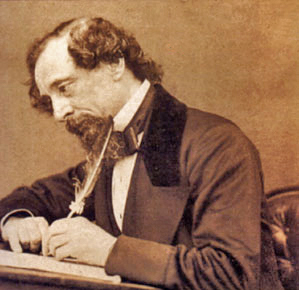Harry Potter Countdown...2: Writing Lessons from the 4 Hogwarts Houses
It is a question fans have been asking since the books were first published; would I be Gryffindor, Ravenclaw, Hufflepuff, or Slytherin? Well, that's a hard question to answer, but I thought today we could look a little bit at what writers can learn from the typical traits of each house.
Gryffindor
The Gryffindor writers love telling stories. They write action well, and write fast. They are brave writers, writing what they like and not worrying too much about so called "rules." They have a healthy confidence in their writing ability and don't weary easily. They have a natural and unintentional knack for writing towards what become trends. Typical genres might be thriller, action or romance. Gryffindor writers should watch out for slipping into sloppiness. They should remember that its okay to slow down, and take time to learn how to improve.
Possible example: Charles Dickens

Ravenclaw
A Ravenclaw writer is a beautiful writer. They take pains to make sure their language is exquisite, and in most cases it pays off. When they brake rules, they do so only because they know how to do it effectively. They are the most careful writers, and therefore often the slowest. But because they are so careful in their writing, a lot of wisdom and experience is distilled into every word. Typical Ravenclaw genres might be literary fiction and regular form poetry. They should beware of aloofness and appearing haughty. They should remember that the mass is who supports their career, and putting time and effort into networking and communicating with readers can pay off.
Possible example: Cormac McCarthy

Hufflepuff
Hufflepuff's are kind writers. The joy they find in writing comes from being able to use words to really connect with and understand other people and human nature in general. They are fiercely loyal to their fans, and most times that loyalty is returned. They like networking, and are particularly supportive of other writers. They may not write as quickly as a Gryffindor, but they are consistent. Typical genres might include adult mainstream, YA and free-form poetry. Hufflepuff's should beware of hinging their confidence too much on what someone may or may not have said in some online forum somewhere, and keep their personal reasons for writing strong and at the forefront.
Possible example: John Green

Slytherin
It goes without saying that Slytherin writers are ambitious. They enjoy the sway and influence that comes with being a well-known author. They work hard, and teach themselves whatever they can about craft and marketing. Like Ravenclaw's, they know all the rules and break them when it suits. They often have a tight-knit group of writers around them, who stick together and support each other. Typical Slytherin genres might be sci-fi or screenplay. They should beware of becoming too cliquey, and letting ambition get in the way of the simple joy of writing.
Possible example: Orson Scott Card

Obviously these are generalities, and no writer fits exactly in one category. But I think its fun to look at what each Hogwarts house might be like as a writer, and what lessons we can learn, both good and bad, from each.
What do you think? Which are you? Can you think of any other examples?
Sarah Allen
Gryffindor
The Gryffindor writers love telling stories. They write action well, and write fast. They are brave writers, writing what they like and not worrying too much about so called "rules." They have a healthy confidence in their writing ability and don't weary easily. They have a natural and unintentional knack for writing towards what become trends. Typical genres might be thriller, action or romance. Gryffindor writers should watch out for slipping into sloppiness. They should remember that its okay to slow down, and take time to learn how to improve.
Possible example: Charles Dickens

Ravenclaw
A Ravenclaw writer is a beautiful writer. They take pains to make sure their language is exquisite, and in most cases it pays off. When they brake rules, they do so only because they know how to do it effectively. They are the most careful writers, and therefore often the slowest. But because they are so careful in their writing, a lot of wisdom and experience is distilled into every word. Typical Ravenclaw genres might be literary fiction and regular form poetry. They should beware of aloofness and appearing haughty. They should remember that the mass is who supports their career, and putting time and effort into networking and communicating with readers can pay off.
Possible example: Cormac McCarthy

Hufflepuff
Hufflepuff's are kind writers. The joy they find in writing comes from being able to use words to really connect with and understand other people and human nature in general. They are fiercely loyal to their fans, and most times that loyalty is returned. They like networking, and are particularly supportive of other writers. They may not write as quickly as a Gryffindor, but they are consistent. Typical genres might include adult mainstream, YA and free-form poetry. Hufflepuff's should beware of hinging their confidence too much on what someone may or may not have said in some online forum somewhere, and keep their personal reasons for writing strong and at the forefront.
Possible example: John Green

Slytherin
It goes without saying that Slytherin writers are ambitious. They enjoy the sway and influence that comes with being a well-known author. They work hard, and teach themselves whatever they can about craft and marketing. Like Ravenclaw's, they know all the rules and break them when it suits. They often have a tight-knit group of writers around them, who stick together and support each other. Typical Slytherin genres might be sci-fi or screenplay. They should beware of becoming too cliquey, and letting ambition get in the way of the simple joy of writing.
Possible example: Orson Scott Card

Obviously these are generalities, and no writer fits exactly in one category. But I think its fun to look at what each Hogwarts house might be like as a writer, and what lessons we can learn, both good and bad, from each.
What do you think? Which are you? Can you think of any other examples?
Sarah Allen


0 Comments:
Post a Comment
Subscribe to Post Comments [Atom]
<< Home